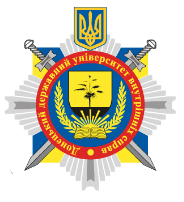ПАРАДИГМА «ПРАВА ЛЮДИНИ – МУНІЦИПАЛЬНІ ПРАВА ЛЮДИНИ – МУНІЦИПАЛЬНА ЛЮДИНА » ЯК СТРАТЕГІЧНО -БАЗОВИЙ НАПРЯМ У ФОРМУВАННІ ТА ФУНКЦІОНУВАННІ ДЕМОКРАТИЧНОЇ ПРАВОВОЇ ДЕРЖАВНОСТІ
DOI:
https://doi.org/10.32782/2523-4269-2022-81-4-1-3-10Ключові слова:
місцеве самоврядування, демократична правова державність, права людини, муніципальні права людини, муніципальна людина.Анотація
У статті досліджується роль управлінської парадигми «права людини – муніципальні права людини – муніципальна людина» як стратегічно-базового напряму у формуванні та функціонуванні демократичної правової державності. Досліджено причини виникнення цієї профільної парадигми, зокрема доводиться, що такими виступають фактори державно-правової і муніципально-правової реальності, згідно з якими саме в межах МСВ людина: а) здійснює свій життєвий цикл; б) реалізує всі свої життєві устремління, потреби та інтереси, що трансформуються в права людини; в) у МСВ реалізується конституційно-правовий статус людини і громадянина. Охарактеризовано сутність парадигми «права людини – муніципальні права людини – муніципальна людина», що носить чіткий та зрозумілий управлінський характер, а також володіє низкою ідентифікаційних ознак: а) суб’єктно-об’єктного складу, б) структурної організації, в) національного та міжнародного нормативно-правового супроводження і забезпечення, що, своєю чергою, наділяє її: а) теоретичним базисом; б) доктринальним обґрунтуванням; в) праксеологічною реалізованістю; г) ціннісно-методологічною орієнтацією; ґ) екзистенційною сутністю та об’єктивно-екзистенційним потенціалом; д) нормативним визначенням; е) констатацією існування управлінських імпульсів; є) об’єктивізацією управлінських дій; ж) конотаційним наповненням; з) комунікативною системою координат; і) стратегічним наративним змістом. Доведено, що складові елементи управлінської парадигми «права людини – муніципальні права людини – муніципальна людина» перебувають у органічному зв’язку між собою завдяки наявності і визначенню їх споріднених характерологічних рис. На основі системного аналізу складових елементів досліджуваної парадигми стверджується, що ознаки-властивості муніципальної людини детермінують управлінський процес, завдяки якому нормативна конструкція «права людини – муніципальні права людини» виступає не тільки як «запускаючий» елемент цієї складної поліоб’єктної, полісуб’єктної, багаторівневої і багатофакторної системи, що базується на екзистенційних засадах, а й як основоположний концепт, навколо якого «обертається» муніципальне буття людини, функціонування публічної влади, а у підсумку й існування та функціонування демократичної правової державності, що супроводжується активними процесами інституціоналізації та конституювання, розвитку і вдосконалення суспільних і державно-правових структур, основною метою діяльності яких і є забезпечення охорони, захисту, реалізації і гарантування прав і свобод людини.
Посилання
Львова Є.О. Глобальний конституціоналізм: теоретичні підходи та правові виклики до формування : автореферат дисертації д-ра юрид. наук. Спеціальність : 12.00.02 «Конституційне право; муніципальне право». Київ, 2020. 32 с.
Баймуратов М., Кофман Б. Конституційно-правовий простір місцевого самоврядування України: параметральні ознаки та роль у становленні локальної демократії. Scientific Collection «InterConf». 2022. № 128. C. 115–124. URL: https://archive.interconf.center/index.php/ conference-proceeding/article/view/1448.
Конституція України: прийнята на п’ятій сесії Верховної Ради України 28 червня 1996 року. Відомості Верховної Ради України. 1996. № 30. Ст. 141.
Григор’єв В. А. Становлення публічної самоврядної (муніципальної) влади в Україні : автореф. дис. ... канд. юрид. наук. Спеціальність : 12.00.13 «Політичні питання правових процесів». Одеса, 2002. 18 с.
Актуальні проблеми становлення та розвитку місцевого самоврядування в Україні : кол. монографія / Антоненко В.О., Баймуратов М.О., Батанов О.В. та ін. ; За ред. В.В. Кравченка, М.О. Баймуратова, О.В. Батанова. Київ : Атіка, 2007. 864 с.
Баймуратов М.О. Локальна система захисту прав людини в Україні: сутність та становлення. Юридична освіта і правова держава : збірник наукових праць. Одеса, 1997. С. 96–101.
Боярський О.О. Індивідуальний габітус людини в умовах місцевого самоврядування: роль індивідуальної соціалізації і індивідуальної правової соціалізації у його становленні й розвитку. Часопис Київського університету права. 2021. № 1. С. 86–96.
Європейська хартія місцевого самоврядування від 15 жовтня 1985 р., ратифікована Законом України № 452/97-ВР. Відомості Верховної Ради. 1997. № 3. Ст. 249.
Конвенція про участь іноземців у суспільному житті на місцевому рівні. Страсбург, 5 лютого 1992 року. URL: https://zakon.rada.gov.ua/ laws/show/994_318#Text.
Переглянута Європейська хартія про участь молоді в місцевому та регіональному житті 2003 року. URL: https://rm.coe.int/168071b58f.
Рекомендация 98 (2001) Конференции Организации Объединенных Наций по населенным пунктам (Хабитат II) о состоянии обсуждения проекта Всемирной хартии о местном самоуправлении. URL: https://rm.coe.int/-98-2001-1-/16807186fb.
Рабінович П.М. Основоположні права людини: соціально-антропна сутність, змістова класифікація. Вісник Національної академії правових наук України. 2013. № 2 (73). С. 10–13.
Баймуратов М.А. Феноменологія муніципальних прав людини. Місцеве самоврядування та регіональний розвиток в Україні : науково-практичний журнал. Київ: «Інтерконтиненталь-Україна». 2013. № 1. Січень–березень. С. 52–56.
Кофман Б.Я. Муніципальні права людини (особистості) як фактор вдосконалення конституційно-правового статусу людини і громадянина. Часопис Київського університету права. 2019. № 2. С. 64–71.
Баймуратов М. Муніципальні права людини як нова константа національного муніципального та конституційного права / М. Баймуратов, Б. Кофман. Право України. 2020. № 10. С. 63–80.
Боярський О. Становлення феноменології муніципальної людини в межах громадянського суспільства і держави. Часопис Київського університету права. 2020. № 2. С. 110–118.





